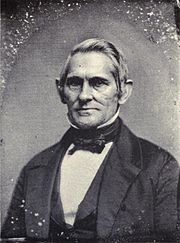Hiram Bingham I
| Hiram Bingham I | |
|---|---|

Missionary to Hawaii
|
|
| Born |
October 30, 1789 Bennington, Vermont, USA |
| Died | November 11, 1869 (aged 80) New Haven, Connecticut, USA |
| Alma mater | Middlebury College |
| Occupation | Missionary, Writer, Translator, Royal Advisor |
| Known for | converting the Kingdom of Hawaii to Christianity and serving as Kawaiahaʻo Church's first pastor |
| Spouse(s) | Sybil Moseley Naomi E. Morse |
| Children | Hiram Bingham II, and six other |
| Parent(s) | Calvin and Lydia Bingham |
| Signature | |
 |
|
Hiram Bingham, formally Hiram Bingham I (October 30, 1789 – November 11, 1869), was leader of the first group of American Protestant missionaries to introduce Christianity to the Hawaiian islands. Like most of the missionaries, he was from New England.
Bingham was descended from Deacon Thomas Bingham, who immigrated to the American colonies in 1650 and settled in Connecticut. He was born October 30, 1789 in Bennington, Vermont, one of thirteen children of his mother Lydia and father Calvin Bingham. He attended Middlebury College and the Andover Theological Seminary.
After breaking his first engagement, Bingham found a new bride, Sybil Mosley. He needed to be married to be accepted as a missionary. On October 23, 1819 the young couple sailed out of Boston aboard the brig Thaddeus, along with Asa and Lucy Goodale Thurston, to lead a mission in the Sandwich Islands (Hawaii) for the American Board of Commissioners for Foreign Missions.
Bingham and his wife arrived first on the Island of Hawaii in 1820, and sailed on to Honolulu on Oahu on April 19. In 1823, Queen Kaʻahumanu and six high chiefs requested baptism. Soon after, the Hawaiian government banned prostitution and drunkenness, which resulted in the shipping industry and the foreign community resenting Bingham's influence. Bingham wrote extensively about the natives and was critical of their land-holding regime and of their "state of civilization." Bingham supported the introduction of market values along with Christianity. Those writings are now used by historians to illustrate the imperial values that were central to the attitudes of the United States towards Hawaii. Bingham was involved in the creation of the spelling system for writing the Hawaiian Language, and also translated some books of the Bible into Hawaiian.
...
Wikipedia
